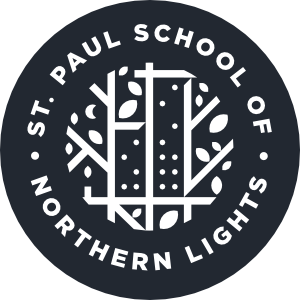Sports and Reggio-Emilia: Rigorous Elegance and Grit
We get many questions about how Reggio-inspired teaching and learning works. I am offering our very first blog post to highlight one of the processes we’ll be using at Northern Lights: Pedagogical documentation. My hope is that drawing this parallel might help connect some of you to a familiar experience, bringing you closer to understanding St. Paul School of Northern Lights’ teaching philosophy and what we are committed to practicing.
Even if you’re not a sports fan, you are likely familiar with the idea that athletes and their coaches deconstruct competitive footage in order to guide future performances. Never in my wildest dreams would I have expected to draw parallels between an Italian teaching philosophy and American football, but I can’t help but notice how they both are gritty and elegant in process. I’ve learned quite a bit in the past two and a half years while attempting to turn this idea into a reality, finding resources along the way. While writing a grant proposal, I stumbled upon a book called Malaguzzi and the Teachers. As the little sister of three talented football players, the images on the book’s cover more closely resembled what I saw in playbooks than any teacher’s notes. Intrigued, I dove into the text, which shares conversations between Loris Malaguzzi, a Reggio philosopher, and teachers learning in Reggio-Emilia. The parallels between football and Reggio were even more prominent as I continued reading. The teachers video recorded time with students and, with Malaguzzi present, analyzed the footage just like many teams do with their coaches. Only rather than counting how long it took a player to make a block, the teachers slowed down the footage--sometimes playing scenes back multiple times, analyzing teaching and learning. Film review days for my brothers’ two-time state championship winning teams were taken very seriously. Done well, it was time for observation, reflection, dialogue, idea-generating, resilience-building, strategy-forming, mourning and celebrating, and relationship-building. The coaches pored over every detail, adapting the process as necessary. They gained insight into the progress of individual players, seeking how to simultaneously support and challenge them next. How should practice be structured this week? How can this be better explained? How can this relationship be strengthened so players trust each other? Coaches have been using this assessment and reflection process for as long as photos and videos have been available. Is it effective? The best coaches, athletes, and teams know that this process is imperative to growing. Applied to education in Reggio-Emilia, this is called “pedagogical documentation.”
To practice pedagogical documentation is to pore over teaching and learning the same way excellent coaches and athletes pour over game day film. This process is rigorous, and also worthwhile. At Northern Lights, our team will be analyzing teaching and learning through the collaborative pedagogical documentation process, studying student work, reflecting, and adapting all week. I hope this comparison can help illuminate the process even slightly, or at least create an entry point for some gritty and elegant conversations.
